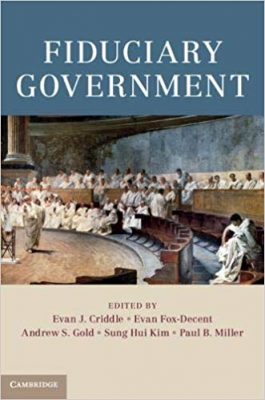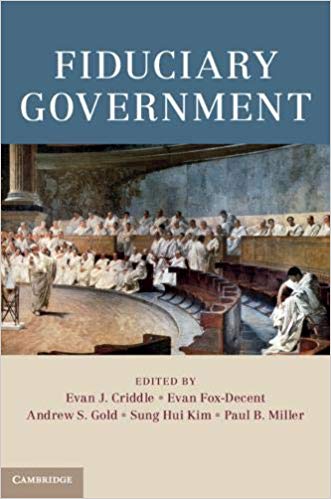 Editors: Evan J. Criddle, Evan Fox-Decent, Andrew S. Gold, Sung Hui Kim, and Paul B. Miller
Editors: Evan J. Criddle, Evan Fox-Decent, Andrew S. Gold, Sung Hui Kim, and Paul B. Miller
Publisher: Cambridge University Press – 342 pages
Book Review by: Sonu Chandiram
A fiduciary is a person who holds a legal or ethical relationship of trust with another person or persons. He or she typically takes care of money or other assets in a prudent way for another person. One party, for example, a corporate trust company or the trust department of a bank, acts in a fiduciary capacity to another party, who, for example, has entrusted funds to the fiduciary for safekeeping or investment.
Financial planners, asset managers, including managers of pension plans, endowments, and other tax-exempt assets, are considered fiduciaries under applicable statutes and laws.
Fifteen specialists in fiduciary principles, all of them professors of law, authored or co-authored the 13 chapters of this book listed below.
Introduction – Fiduciary Government: Provenance, Promise, and Pitfalls
- Part I – Modes of Governance
- Fiduciary Representation
- Two Problems of Fiduciary Governance
- Guardians of Legal Order: The Dual Commissions of Public Fiduciaries
- Fiduciary Theory
- Part II – Historical Approaches
- “The State is a Minor”: Fiduciary Concepts of Government in the Roman Law of Guardianship
- Fiduciary Government and Public Officers’ Incentives
- Part III – The Problem of Legitimacy
- Fiduciary Political Theory and Legitimacy
- The State as a Wrongful Fiduciary
- Part IV – Corruption and Breach of Trust
- The Supreme Court’s Fiduciary Duty to Forgo Gifts
- Congressional Officials and the Fiduciary Duty of Loyalty: Lessons from Corporate Law
- The American Law of Local Officials as Fiduciaries: Lessons on Fiduciary Government’s Potential and Limits
- Part V – Skeptical Challenges
- Pluralism and the Public Trust
- The Public Trust
‘Fiduciary government’ is a relatively new term, and it essentially means that public officials enjoy a position of power but owe obligations to the people whom they serve, comparable to those of agents and trustees.
The editors point out in the Introduction that in recent years, legal scholars have recognized the shortcomings of social contract theories of government, and many of them have looked to fiduciary obligation as a new model for ‘legitimizing public authority’ and explaining the obligations of the state and public officials.
Recent concerns about possible bias and corruption have raised attention to the idea that public officers and institutions bear fiduciary duties to avoid conflicts of interest in which they personally benefit, particularly in financial ways. Those concerns about conflicts of interest have brought about the idea – as a matter of fact, the imperative – that public officials use their entrusted power for the public good.
The growing need for government and the people in it who serve the public, to be aware of their fiduciary responsibility – is the basic theme of this book. In particular, this book advances the idea and the theory of public fiduciary responsibility, and elevates it to a practical level.
The editors and authors point out that this book:
- Deepens our awareness of the idea’s distinctive conceptual and normative advantages for legal and political theory
- Enriches our appreciation of the intellectual history of fiduciary government by examining the idea’s development in Europe and the United States
- Sharpens our understanding of the idea’s potential applications to various areas of substantive law, including administrative, constitutional, and public international law
- Engages with conceptual and normative challenges for the idea of fiduciary government that has yet to be adequately addressed.
Not much has been written before (that we’re aware of) about the fiduciary responsibilities of public officials. This book then, is a refreshing, welcome change. It provides a new way of looking at the obligations of those who govern upon the governed.
Editors:
Evan J. Criddle is Professor of Law at William and Mary Law School. His books include Fiduciaries of Humanity: How International Law Constitutes Authority (2016) with Evan Fox-Decent, and The Oxford Handbook of Fiduciary Law (2019). His articles on fiduciary government have appeared in the Cornell Law Review, Northwestern University Law Review, Texas Law Review, and UCLA Law Review.
Evan Fox-Decent is Professor of Law at McGill University Faculty of Law. His books include Sovereignty’s Promise: The State as Fiduciary (2012) and Fiduciaries of Humanity: How International Law Constitutes Authority (2016)
Andrew S. Gold is Professor of Law at Brooklyn Law School. He has also been the Bruce W. Nichols Visiting Professor at Harvard Law School. He has been an H.L.A. Hart Visiting Fellow at the University of Oxford; and a Fulbright Visiting Research Chair at McGill University. He is the co-editor of Philosophical Foundations of Fiduciary Law (2014), Contract, Status, and Fiduciary Law (2016), The Research Handbook of Fiduciary Law (2019), and the Oxford Handbook of New Private Law (forthcoming).
Sung Hui Kim is Professor of Law at UCLA Law School. Her scholarship has appeared in Capital Markets Law Journal, Cornell Law Review, Proceedings of the American Philosophical Society, UCLA Law Review, Securities Law Review and the University of Chicago Press. She has co-authored Professional Responsibility: A Contemporary Approach, 3rd edition (2017) and co-edited Can Delaware Be Dethroned?: Evaluating Delaware’s Dominance of Corporate Law (2018)
Paul B. Miller is Professor of Law and Associate Dean for International and Graduate Programs at Notre Dame Law School. He has co-authored Philosophical Foundations of Fiduciary Law (2014), Contract, Status, and Fiduciary Law (2016), and the Oxford Handbook of New Private Law (forthcoming).






